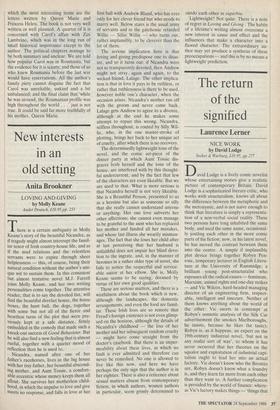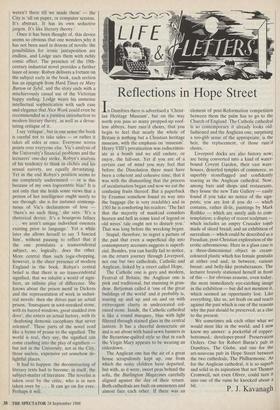The return of the signified
Laurence Lerner
NICE WORK by David Lodge
Secker & Warburg, f10.95, pp.277
David Lodge is a lively comic novelist whose entertaining stories give a realistic picture of contemporary Britain. David Lodge is a sophisticated literary critic, who works with structuralism, knows all about the difference between the metaphoric and the metonymic, and is not naive enough to think that literature is simply a representa- tion of a non-verbal social reality. These two persons have long inhabited the same body, and used the same name, occasional- ly jostling each other in the more comic parts of his fiction; now, in his latest novel, he has moved the contrast between them into the centre. A simple if implausible plot device brings together Robyn Pen- rose, temporary lecturer in English Litera- ture at the University of Rummidge, a brilliant young post-structuralist who espouses all the radical causes — feminism, Marxism, animal rights and one-day strikes — and Vic Wilcox, hard-headed managing director of an engineering firm, respect- able, intelligent and insecure. Neither of them knows anything about the world of the other: Vic snorts in contempt at Robyn's semiotic analysis of the Silk Cut advertisement (he smokes Marlboroughs, he insists, because he likes the taste); Robyn is, as it happens, an expert on the 19th-century industrial novel, 'but not in any realist sort of way', to whom it has never occurred that her theories on the squalor and exploitation of industrial capi- talism ought to lead her into an actual factory. Vic doesn't know who the Brontes are, Robyn doesn't know what a foundry is, and they learn far more from each other than they want to. A further complication is provided by the world of finance: where- as Vic's factory makes things — 'things that weren't there till we made them' — the City is 'all on paper, or computer screens. It's abstract. It has its own seductive jargon. It's like literary theory.'
Once it has been thought of, this device seems so obvious that one wonders ,why it has not been used in dozens of novels: the possibilities for ironic juxtaposition are endless, and Lodge uses them with richly comic effect. The presence of the 19th- century industrial novel provides a further layer of irony: Robyn delivers a hcture on the subject early in the book, each section has an epigraph from Hard Times or Mary Barton or Sybil, and the story ends with a mischievously casual use of the Victorian happy ending. Lodge wears his immense intellectual sophistication with such ease and elegance that Nice Work could even be recommended as a painless introduction to modern literary theory, as well as a devas- tating critique of it.
I say 'critique', but in one sense the book is careful not to take sides — or rather it takes all sides at once. Everyone scores points over everyone else. Vic's analysis of the University's financial problems and the lecturers' one-day strike, Robyn's analysis of his tendency to think in clichés and his sexual naivety, are equally devastating. Yet in the end Robyn's position seems to me completely undermined — or is this because of my own logocentric bias? It is not only that she holds some views that a person of her intelligence ought surely to see through: she is for instance contemp- tuous of Vic's declarations of love 'there's no such thing,' she says. 'It's a rhetorical device. It's a bourgeois fallacy . . . we aren't unique individual essences existing prior to language.' Yet a while later she allows herself to say 'I fancied him', without pausing to reflect that if the one postulates a transcendental subject, so, logically, does the other. More central than such logic-chopping, however, is the sheer presence of modern England in the book. Robyn's central belief is that there is no transcendental signified, that we inhabit a world of signi- fiers, an infinite play of difference. She knows about the prison motif in Dickens and the representation of work in indust- rial novels: then she drives past an actual prison, 'foursquare in soot-streaked stone, with its barred windows, great studded iron door', she enters an actual factory, with its 'deafening demonic cacophany that never relented'. These parts of the novel read like a hymn of praise to the signified. The world is real, they say, the signified can come crashing into the play of signifiers but not in the University, not in the City, those useless, expensive yet somehow de- lightful places.
It had to happen: the deconstructing of literary texts had to become, in itself, the subject-matter of literature. The novelist is taken over by the critic, who is in turn taken over by . . . It can go on for ever. Perhaps it will.































































 Previous page
Previous page